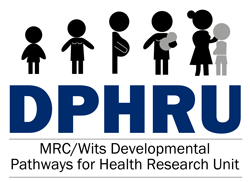Completed research activities
Infancy programme
Soweto First 1000 Days cohort: Infant and child follow-up study
Principal Investigator Prioreschi and Co-Investigator McConnell
This was a longitudinal follow-up of a sub-sample of Soweto First 1000 Days (S1000) participants who could still be contacted in 2018. The women and their children (then aged 4-5 years old) were assessed for physical activity, screen time, sleep, diet, and adiposity. This work is being analysed to determine whether any intergenerational effects observed during pregnancy and infancy have continued into the early childhood period.
HeLTI formative Work: Infancy
Principal Investigator Norris and Co-Investigators Prioreschi, Slemming and Cohen
This work formed part of the HeLTI formative studies and aimed to determine perceptions and understanding of infant feeding behaviours, growth, movement and play, and infant health from the perspective of mothers in Soweto. Focus groups and indepth interviews were conducted to determine how these behaviours were perceived and what barriers mothers in Soweto faced. This research is currently being analysed.
Measuring infant physical activity using accelerometery
Principal Investigator Prioreschi and Co-Investigators Micklesfield, Brage and Olivier
This cross-sectional work aimed to develop a methodology to measure infant movement objectively using accelerometery. An infant wearable wrist band was developed and tested and made commercially available. This research identified sexual dimorphism in both infant movement and parental beliefs about infant activity from 3 months of age. Data shows that infants spent the majority of their time in lower intensity activities, but that boys spent more time in higher intensity activities than girls from as early as 3 months. Furthermore, higher intensity activity was associated with earlier attainment of developmental milestones; and associations exist between physical activity, stature and abdominal adiposity. Data also shows that the majority of infants are meeting recommended movement guidelines for physical activity but not for sleep or sedentary behaviour and, consequently, are not meeting the 24-hour movement guidelines. Preliminary findings using synchronous 24-hour accelerometery show that physical engagement between mothers and infants strongly influences infant movement and suggests the important role of caregiving as a key target for intervention to improve early child movement, growth and development. This work was funded by an Academy of Medical Sciences Newton Advanced Fellowship (PI-Micklesfield). The methodology for this work is in the process of being implemented
into other longitudinal cohort studies (such as ALSPAC in the UK) internationally through collaboration with Dr Prioreschi.


